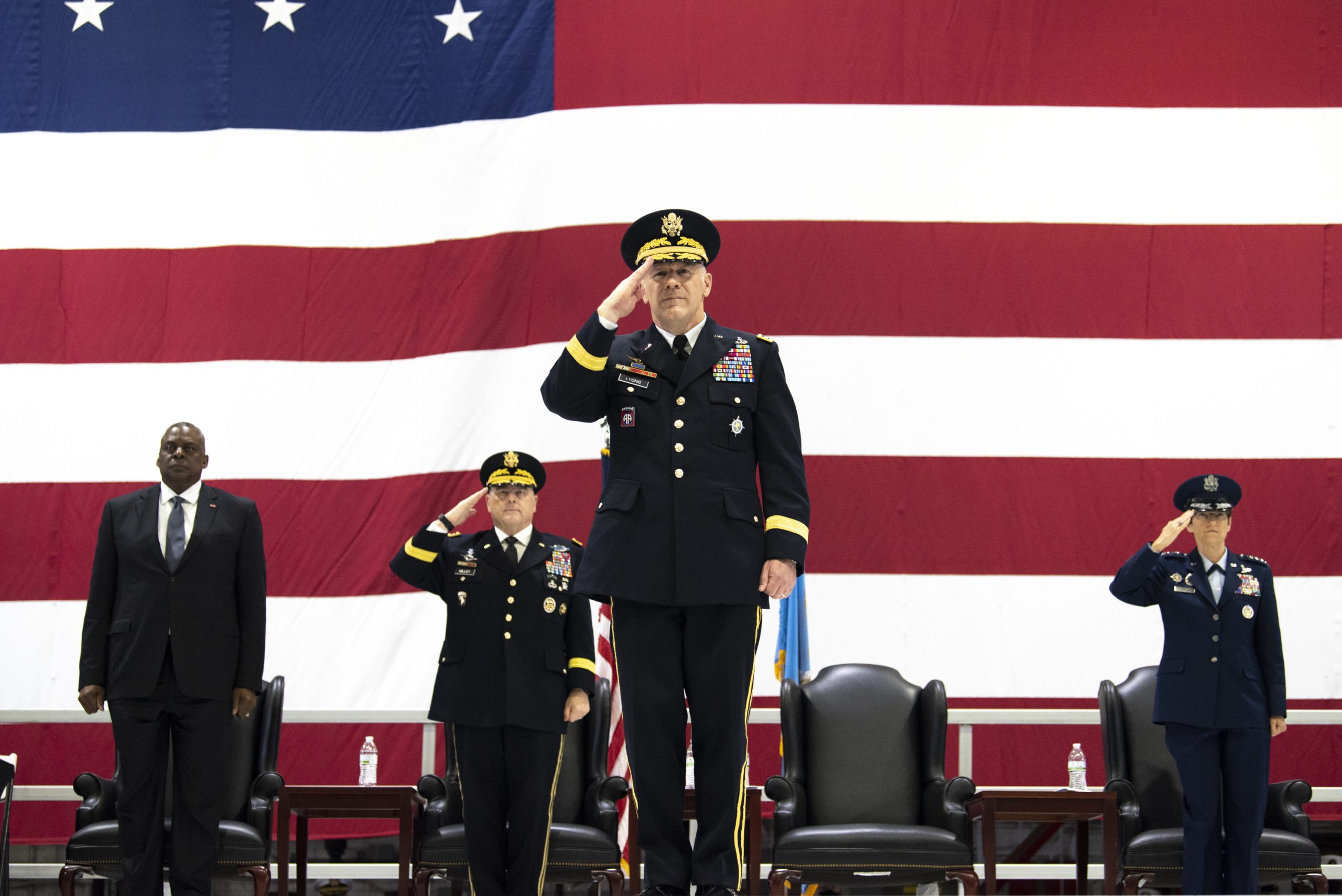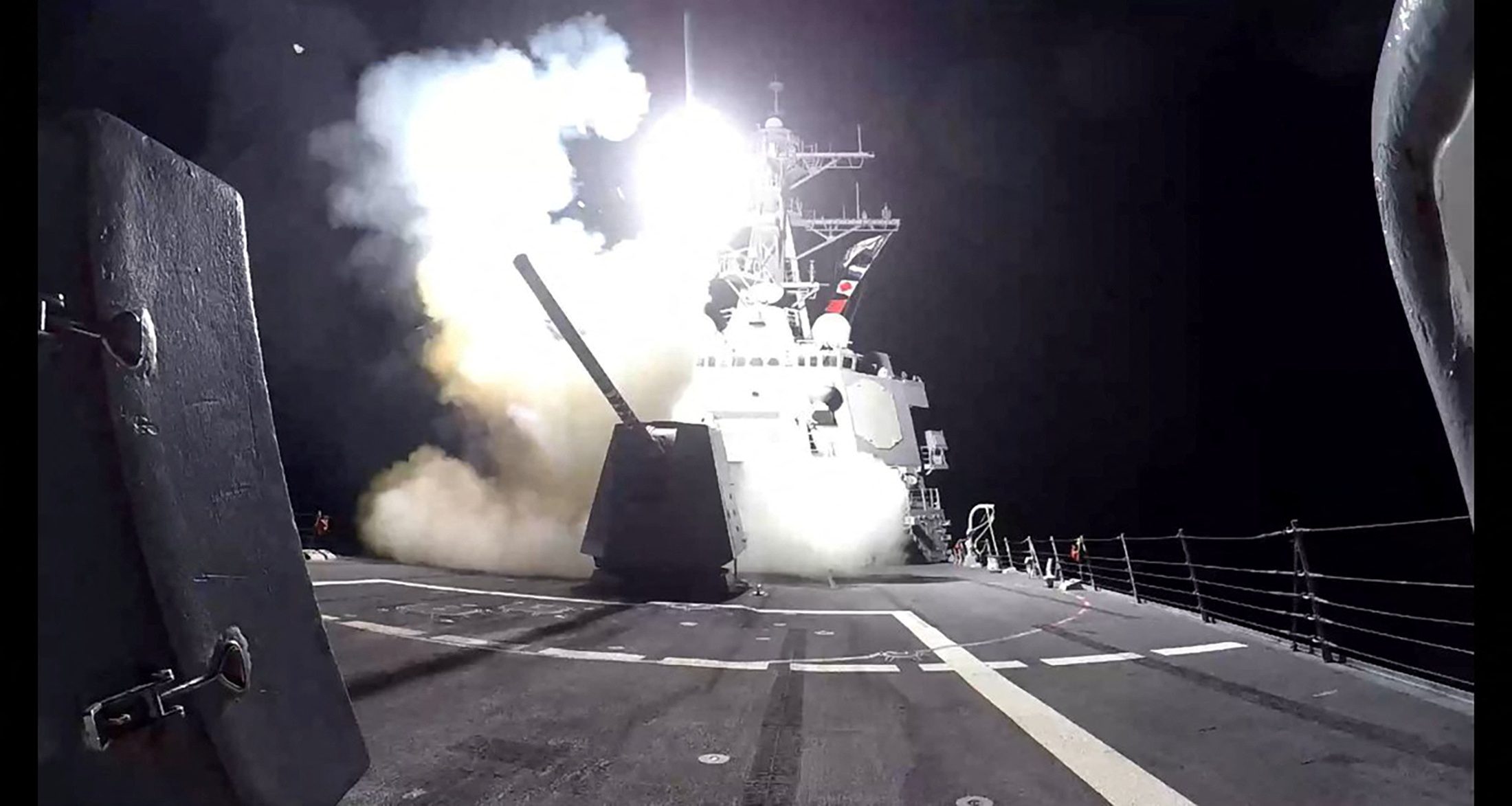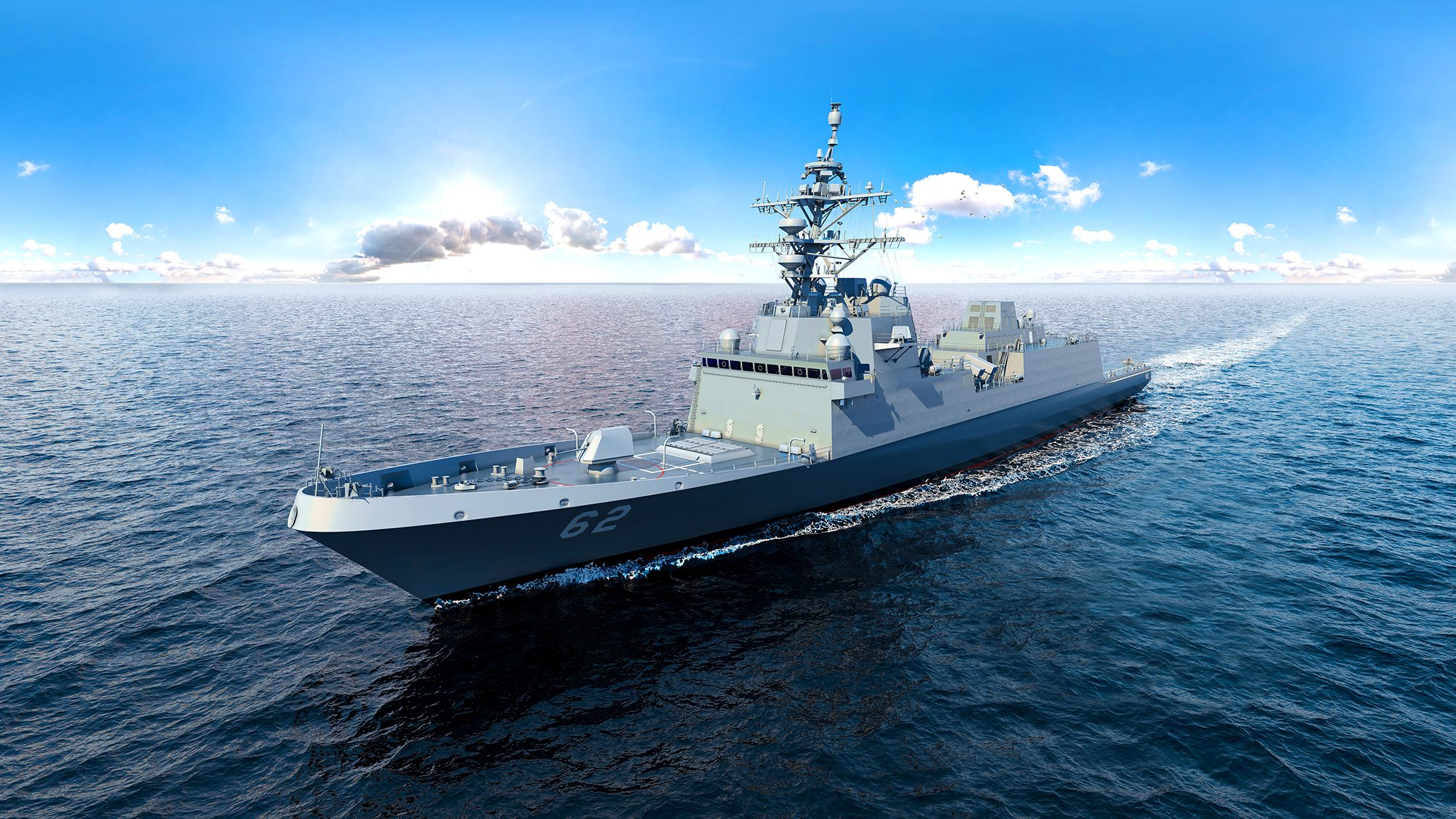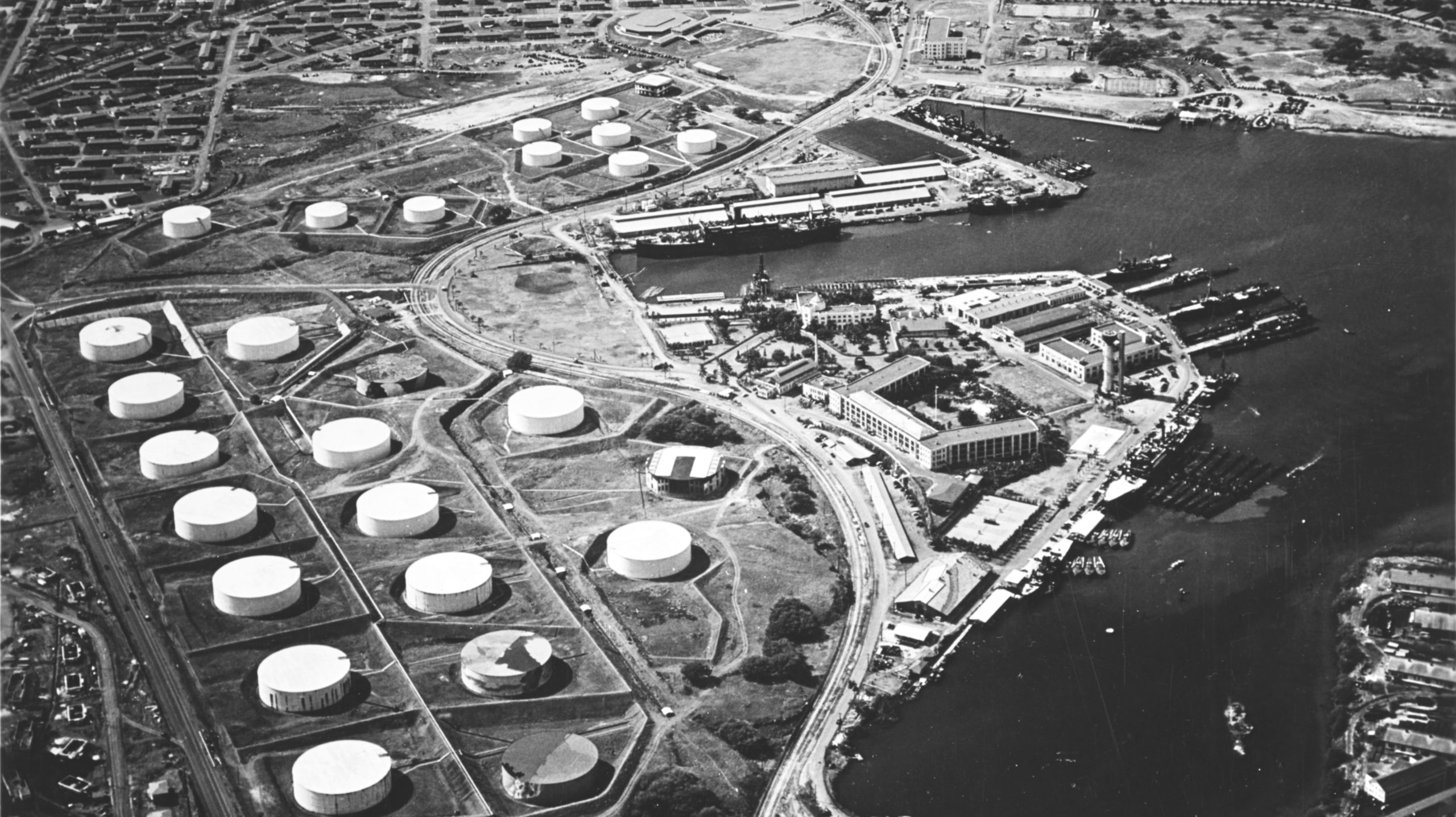by Captain John Konrad (gCaptain) Yesterday gCaptain helped announce the appointment of US Army General Lyons as the new White House Port Envoy tasked with solving the port congestion problem. Lyons is by all accounts a great leader who brings a great deal of knowledge and authority to the problem but he does not know finance and will fail unless he builds the right team around him.
Since the Russian invasion of Ukraine, gCaptain, has gone down the rabbit hole of military spending, military operations, and military intelligence with a special interest in military logistics. We are not alone, most of the world now understands the old adage that “tactics win battles but logistics wins wars”, but our focus has not been on the Javelin missile systems or the defense of Kyiv, our focus has been on the maritime domain. While the world focused on logistical missteps in Ukraine’s interior, gCaptain was the first to warn of Russia’s blockade of ports and attacks on shipping. We were able to do this by combining information from military sources with those from commercial shipping.
These two domains do not typically play well together. It is very rare to see an American naval officer at a commercial maritime conference and, while some segments of the maritime industry like oil majors are active in the national security community, major liner companies typically are not. Only the US Coast Guard attends both.
What gCaptain has discovered while focusing our research at the intersection of naval affairs and commercial shipping is highly troubling. 90 percent of the world economy is transported on ships and no single invention has pulled more people from poverty and improved nearly everyone’s quality of living more than the shipping container yet this world remains invisible to both the average citizen and corporations which expect the shipment of goods on the world’s oceans to be seamless without concern for maritime security. On the other side of the coin, concepts like ship finance are misunderstood by military experts.
Related Book: To Rule the Waves: How Control of the World’s Oceans Determines the Fate of the Superpowers by Bruce Jones
A lack of concern over naval affairs by companies that ship goods is astonishing to a mariner like myself who was taught the following saying from one of the greatest US Merchant Marine captains of all time, Felix Riesenberg, “The sea is selective; slow at the recognition of effort and aptitude, but fast in sinking the unfit.”
Oceans are dangerous and the rapid increase of military aggression – Russia – and naval buildup of forces – China – from the most powerful naval nations in the world is making them fraught with uncertainty and peril yet US Navy ship numbers are falling and – without much voter support – the ability of Western navies to patrol the seas is declining.
Lyons understands the risk of maritime transport like few others. While stationed as America’s 4 Star general in charge of military transportation, Lyons worked tirelessly to support the US Maritime Administration’s efforts to bolster the US Merchant Marine, train additional mariners, and stress test the US Military’s maritime transportation system with Turbo Activations of the nation’s Ready Reserve Fleet. He supported a new tanker security program in Congress to bolster America’s fleet of oil tankers. He got Congress to fully understand the importance of sealift.
What Lyons accomplished during his tenor as the head of Transportation Command (TRANSCOM) far surpassed the expectations of every marine transportation advocate in the United States yet, his efforts have not led to significant change. The US Merchant Marine is just as broken and old as it was when joined TRANSCOM in 2015. Small advances like the Tanker Security Program have been offset by huge catastrophes like the closure of the US Military’s Red Hill bunker fuel facility in Hawaii.
Lyons is a brilliant and capable leader who understands the logistical challenges the world faces better than almost anyone alive but he failed to make a difference at TRANSCOM and he will fail as Port Envoy unless he takes a deep look inside and corrects course in a few fundamental ways.
American Sea-Blindness
Seablindness is a mindset under which great maritime powers forget the oceanic foundation of their commerce. Ocean transportation has become so cheap and effective that most Americans take it for granted. They also take for granted that the US Navy has command of the sea.
Lyons did a fabulous job educating Congress to the problems facing the US Merchant Marine but he completely failed to engage industry publications like gCaptain or Freigthwaves or major media outlets like 60 Minutes, Fox News, or CNN.
He failed to share the story he told congress with the Maritime Industry itself and the American public at large. When Admiral Thad Allen looked to rebuild the US Coast Guard in the wake of the Deepwater Scandals he invited maritime media outlets on shipyard tours aboard his private jet, at Transcom Lyons barely worked to send out generic press releases.
Countless studies have proven the fact that voters respond to stories, Lyons is a master at weaving stories to inspire Congress and the soldiers he has led, but has done very little to engage industry and the American people.
The White House is the most powerful media bullhorn in the world. This bullhorn could be used to cure sea blindness and sound a warning to all Americans about dangers imposed by Russia and China or, as was done by with the previous Port Envoy John Porcari, could be used to further cement sea blindness by moving ships from congested anchorages to drift zones far away from media cameras.
Marine And Military Finance
In appointing Lyons the White House seems to think that military logistics experience equates to commercial freight experience. Little could be further from the truth.
The absence of profit and loss considerations and accountability with shareholders and bankers is a major disconnect between military leadership in the United States and commercial shipping.
In all the years of watching General Lyons address congress, I have never once heard him discuss the cost of capital, reference bond yields, risk derivatives, or the modern code of capital.
Lyons is smart and well-loved but is a complete stranger to the Wall street bankers and marine money professionals he will need to finance any meaningful initiatives. When military leaders are successful in solving commercial problems progress is usually made only after a lengthy listening tour where they talk to commercial experts. After they’ve done that for a couple of years, they begin to have a passing knowledge of what they should have had to begin with to do the job they were selected for.
One of the real problems in the maritime space is that many of the key people you would want to deal with have survived many years of stunted government initiatives. Professional maritime finance executives who develop bond deals for ports, for example, have gone through countless federal fire drills where organizations like MARAD promise the world then back out quickly after a lot of serious work has been done. The finance professionals gCaptain has interviewed aren’t particularly interested in spending time with the military folk now wearing commercial hats unless they are looking for special treatment. They certainly are not interested in working with a US Maritime Administrator who has a fraction of Lyon’s military logistics knowledge and no connections to Wall Street.
Lyons can not order Merchant Marine captains, port executives, overseas carriers, labor unions, or even truckers to follow orders. He MUST “show them the money” and that money must be more than government subsidies, it must be using his power to cut red tape and facilitate private capital arrangements. Without a background in finance or much time spent on Wall Street that is a tall order for a retired General.
The Fabric Of Military Planning
What has been most shocking in my exploration of military operations and global security in the wake of the Ukraine War is the sheer number of resources devoted to high-level military problems.
A truly mind-bending number of well-funded and influential think tanks, PhD programs, publications, policy groups, influencers, and organizations are dedicated to studying military operations and strategic policy.
Entire buildings exist on Ivy League campuses, at federally subsidized war colleges, in national capitals, and at pristine locations like Santa Monica Beach all devoted to the task of making the world a safer place via military intervention. Some specialize in naval seapower, some in air superiority, others in military budgets, or strategic partnerships.
Not one, however, employs a merchant marine ship captain or engineer. Not one.
Even the most contentious out-of-the-box thinking organizations like War On The Rocks, completely and utterly glide over the power and importance of commercial shipping in war planning. Even after Russia has focused on securing ports and sealift capacity, War On The Rocks published an article by an Air Force Colonel claiming China can not invade Tawain because they don’t have enough amphibious landing ships in their inventory to move enough equipment.
“The People’s Liberation Army lacks the necessary power projection and sustainment capability and capacity to execute an opposed occupation of a densely urbanized island,” says retired Air Force Colonel Mike ‘Starbaby’ Pietrucha in War On The Rocks. “The obvious method of movement of large numbers of vehicles is to use vehicle carriers, ranging from the big, dedicated roll-on/roll-off ships to seagoing ferries. Therefore it is necessary to capture a port relatively intact, but even then, the landing forces are vulnerable.”
A call to any merchant marine Captain with offshore construction experience would have blown holes in the narrative that China NEEDS intact ports to land supplies in Taiwan. It’s unlikely that Colonel ‘Starbaby’ knows any US Merchant Marine captains and War On The Rocks certainly does not have any on its editorial staff.
The best these organizations do is publish a disclaim like this one from ‘Starbaby’, “While an analysis of the carrying capacity of the commercial vessels belonging to China (and Hong Kong) is beyond the scope of this paper, these ships are next to useless in an assault phase and come into play only if adequate, intact port facilities are captured.”
Beyond the scope of this paper? At first glance, this just seems lazy until you realize that the landing of commercial ships in Taiwan is not just a part of China’s invasion plan but is the CENTRAL ELEMENT in it.
Even strategies that focus on the importance of the maritime domain fail. In a highly praised article War On The Rocks published last week Zack Cooper – a senior fellow at the American Enterprise Institute – and Gregory Poling – director of the Southeast Asia Program and Asia Maritime Transparency Initiative at the Center for Strategic and International Studies – promote an announcement by President Joe Biden during his trip to Asia. They praise ‘The Quad’ – a grouping consisting of Australia, India, Japan, and the United States – for announcing a maritime domain awareness partnership that will provide a new stream of data from commercial satellites to countries across the Indo-Pacific.
This article was picked up by security experts thorough the world who praised Cooper and Poling for bringing light on the issue of better maritime awareness in the Pacific. This announcement is important indeed, but like every other attempt by the Pentagon and State Department to secure the oceans, will fail if they do not invite ship captains in to interpret the data.
Data plus expertise and insight are the prerequisites for sound military policy, not partnerships forged by people who have never stepped foot aboard a working ship.
You simply can not ignore the people who are out at sea aboard and in command of the ships you “want to monitor and regulate”. You must invite them to the table. Articles like Cooper’s and Poling’s are, in fact, more dangerous than ’Starbaby’s’ because it doesn’t even provide a disclaimer. It just assumes that the “The Quad” has maritime domain experts with real experience commanding ships in the ocean, and working on interpreting the data. They don’t.
Not a single institute, policy group, think tank, etc, we could find has a US Merchant Marine captain on staff – the very few that do employ Military Sealift Command and Strategic Sealift officers who, while highly competent and experienced, do not have experience in the ports and docks of the worlds upcoming naval powers India, China, and Russia – and THIS lack of experience is the biggest threat facing our nation at sea.
LYONS NEEDS HELP
Lyons is an extremely competent, well-liked, and effective military leader. He can be effective in this job but, to do so he must recruit the right team of experts and work on these three outstanding areas of concern.
The Story – Lyons is capable of telling a great story, he has convinced Congress of the importance of maritime transportation – but now he needs to turn that communication outward. First, he needs to engage the maritime industry via the top maritime and logistics publications. Then he needs to use the bullhorn of the White House’s communication system to tell the American exactly what problems we face at sea.
Finance – China has leveraged capital markets to build not only the worlds largest and most effective ports but also commercial ships and warships. Rebuilding America’s ports and Merchant Marine is too big and expensive of a job for the US Government alone but lucky for Lyons we still have the largest and most robust financial system on earth. Lyons can not expect Congress to write all the checks, he must forge the ties between Wall Street and Washington needed to attract private capital.
Fabric – Whatever Lyons attempts will fail if his initiatives are put in the hands of global security think tanks and experts who have no experience aboard ships and in commercial ports. Lyons needs to work with these organizations to hire Merchant Marine Captains and Port/Shipping Executives otherwise the policies he pushes forward will be adulterated by those with no domain experience who are writing policy and navigating our nation’s course. He needs to consider MARPA – A New Maritime Advanced Research Project Agency – and opening a maritime desk within the Pentagon as well.
This is a tall order even for a 4 star general with the full weight of the White House behind him. It’s a tall order because, after decades of being ignored, ostracized and the subject of broken promises, the Merchant Marine, maritime finance professionals, and American shipping executives are skeptical that this time will be different. The people we need to help Lyons do not want to be burned again with promises and the people who want to help him (e.g. certain K-street maritime policy groups) will lead him astray.

 Join The Club
Join The Club











